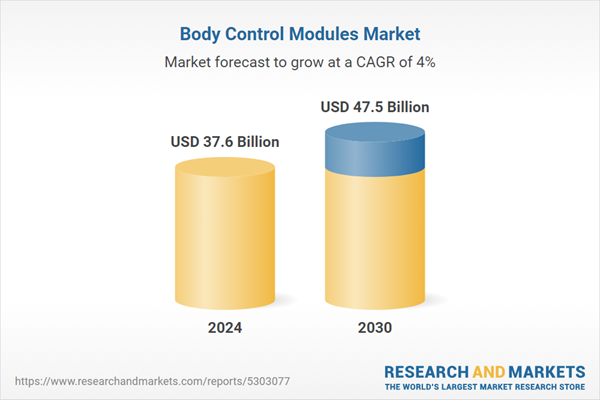Global Body Control Modules (BCM) Market - Key Trends & Drivers Summarized
How is the Body Control Module Transforming Automotive Electronics?
The body control module (BCM) is a critical component in modern vehicles, responsible for managing various electronic systems that enhance vehicle functionality, safety, and convenience. As cars become more reliant on electronics, the BCM serves as the central hub that controls a wide range of body functions, including lighting, door locks, windows, mirrors, wipers, and security systems. By integrating these functions into a single control unit, the BCM simplifies the vehicle's electronic architecture, reducing the need for separate wiring and improving system reliability. This centralization also allows for more efficient communication between different systems, improving vehicle performance and reducing the risk of electronic failures.The growing trend toward vehicle electrification and advanced driver assistance systems (ADAS) is further increasing the importance of BCMs. In electric and hybrid vehicles, BCMs manage crucial functions such as energy distribution, battery management, and regenerative braking systems. Additionally, with the rise of autonomous driving technologies, BCMs are being integrated with more sophisticated sensors and control units to manage ADAS features such as lane departure warning, adaptive cruise control, and automatic emergency braking. These advancements are making BCMs an essential part of the electronic infrastructure in modern vehicles, contributing to improved safety, comfort, and energy efficiency.
What Role Does the BCM Play in Vehicle Safety and Convenience?
The body control module plays a pivotal role in enhancing both the safety and convenience of modern vehicles by automating and managing essential functions. On the safety side, BCMs control key systems such as anti-theft alarms, central locking, and tire pressure monitoring, ensuring that drivers are alerted to potential threats or issues before they escalate. The integration of BCMs with safety features like airbags, seatbelt reminders, and collision detection systems also ensures that these critical components are deployed effectively during emergencies, potentially saving lives. Additionally, BCMs can manage lighting systems, including automatic headlights, high beam assist, and brake lights, improving visibility and reducing the risk of accidents.In terms of convenience, BCMs automate various comfort and convenience features that enhance the driving experience. Functions such as automatic climate control, power windows, remote keyless entry, and electric mirrors are all managed by the BCM, providing drivers and passengers with a more seamless and enjoyable ride. For instance, the BCM can ensure that windows close automatically when the car is locked, or adjust the interior lighting based on ambient conditions. As vehicles become more sophisticated, BCMs are increasingly responsible for managing smart infotainment systems, navigation controls, and personalized driver settings, further elevating their importance in the modern automotive landscape.
How is the BCM Market Adapting to the Rise of Electric and Autonomous Vehicles?
The rise of electric and autonomous vehicles is transforming the body control module (BCM) market, as these vehicles require more advanced and integrated electronic systems to manage their complex functions. In electric vehicles (EVs), BCMs play a critical role in managing energy-efficient functions, including battery management, power distribution, and regenerative braking. These systems are essential for optimizing the performance and range of EVs, ensuring that energy is used efficiently and that the vehicle operates safely under different conditions. As the global shift toward electrification continues, demand for more sophisticated BCMs that can handle the unique challenges of EVs is expected to rise.Autonomous vehicles are further pushing the boundaries of what BCMs can manage. With an increasing reliance on sensors, cameras, and artificial intelligence (AI), autonomous vehicles require BCMs that can process vast amounts of data in real time to manage functions such as collision avoidance, lane keeping, and automated parking. The integration of these advanced driver assistance systems (ADAS) into the BCM architecture is becoming critical as vehicles move closer to full autonomy. Additionally, as vehicles become smarter, with features such as voice control and smart home integration, the role of BCMs is expanding to manage more connected and intelligent functions, making them central to the future of automotive technology.
What Factors Are Driving the Growth of the Body Control Module Market?
The growth in the body control module (BCM) market is driven by several factors, including the increasing electrification of vehicles, the rising demand for advanced driver assistance systems (ADAS), and the growing consumer preference for connected, smart vehicles. The shift toward electric vehicles (EVs) is one of the primary drivers, as EVs require more sophisticated BCMs to manage energy distribution, battery management, and other critical systems. As governments around the world push for more sustainable transportation solutions, the demand for BCMs that support the unique needs of electric and hybrid vehicles is expected to rise.The growing adoption of ADAS in both conventional and electric vehicles is another key factor driving the BCM market. As automakers incorporate features such as automatic emergency braking, lane-keeping assist, and adaptive cruise control, the need for BCMs that can seamlessly integrate and manage these systems is increasing. Additionally, the rising demand for vehicle connectivity and smart features, such as voice-activated controls, remote diagnostics, and smartphone integration, is expanding the scope of BCMs beyond traditional functions. As vehicles become more digital and connected, BCMs are playing a central role in managing these new capabilities, contributing to the overall growth of the market.
Report Scope
The report analyzes the Body Control Modules market, presented in terms of market value (US$ Thousand). The analysis covers the key segments and geographic regions outlined below.- Segments: Component (Hardware, Software); Vehicle Type (Light-Duty Vehicle, Heavy-Duty Vehicle).
- Geographic Regions/Countries:World; United States; Canada; Japan; China; Europe (France; Germany; Italy; United Kingdom; and Rest of Europe); Asia-Pacific; Rest of World.
Key Insights:
- Market Growth: Understand the significant growth trajectory of the Hardware Component segment, which is expected to reach US$29.6 Billion by 2030 with a CAGR of a 3.8%. The Software Component segment is also set to grow at 4.2% CAGR over the analysis period.
- Regional Analysis: Gain insights into the U.S. market, valued at $10.1 Billion in 2024, and China, forecasted to grow at an impressive 3.9% CAGR to reach $7.6 Billion by 2030. Discover growth trends in other key regions, including Japan, Canada, Germany, and the Asia-Pacific.
Why You Should Buy This Report:
- Detailed Market Analysis: Access a thorough analysis of the Global Body Control Modules Market, covering all major geographic regions and market segments.
- Competitive Insights: Get an overview of the competitive landscape, including the market presence of major players across different geographies.
- Future Trends and Drivers: Understand the key trends and drivers shaping the future of the Global Body Control Modules Market.
- Actionable Insights: Benefit from actionable insights that can help you identify new revenue opportunities and make strategic business decisions.
Key Questions Answered:
- How is the Global Body Control Modules Market expected to evolve by 2030?
- What are the main drivers and restraints affecting the market?
- Which market segments will grow the most over the forecast period?
- How will market shares for different regions and segments change by 2030?
- Who are the leading players in the market, and what are their prospects?
Report Features:
- Comprehensive Market Data: Independent analysis of annual sales and market forecasts in US$ Million from 2024 to 2030.
- In-Depth Regional Analysis: Detailed insights into key markets, including the U.S., China, Japan, Canada, Europe, Asia-Pacific, Latin America, Middle East, and Africa.
- Company Profiles: Coverage of players such as Aptiv, Calsonic Kansei Corporation, Continental, Denso, Diamond Electric and more.
- Complimentary Updates: Receive free report updates for one year to keep you informed of the latest market developments.
Some of the 42 companies featured in this Body Control Modules market report include:
- Aptiv
- Calsonic Kansei Corporation
- Continental
- Denso
- Diamond Electric
- Embitel
- Hella
- Infineon Technologies
- Lear Corporation
- Luxshare
This edition integrates the latest global trade and economic shifts into comprehensive market analysis. Key updates include:
- Tariff and Trade Impact: Insights into global tariff negotiations across 180+ countries, with analysis of supply chain turbulence, sourcing disruptions, and geographic realignment. Special focus on 2025 as a pivotal year for trade tensions, including updated perspectives on the Trump-era tariffs.
- Adjusted Forecasts and Analytics: Revised global and regional market forecasts through 2030, incorporating tariff effects, economic uncertainty, and structural changes in globalization. Includes historical analysis from 2015 to 2023.
- Strategic Market Dynamics: Evaluation of revised market prospects, regional outlooks, and key economic indicators such as population and urbanization trends.
- Innovation & Technology Trends: Latest developments in product and process innovation, emerging technologies, and key industry drivers shaping the competitive landscape.
- Competitive Intelligence: Updated global market share estimates for 2025, competitive positioning of major players (Strong/Active/Niche/Trivial), and refined focus on leading global brands and core players.
- Expert Insight & Commentary: Strategic analysis from economists, trade experts, and domain specialists to contextualize market shifts and identify emerging opportunities.
Table of Contents
Companies Mentioned (Partial List)
A selection of companies mentioned in this report includes, but is not limited to:
- Aptiv
- Calsonic Kansei Corporation
- Continental
- Denso
- Diamond Electric
- Embitel
- Hella
- Infineon Technologies
- Lear Corporation
- Luxshare
Table Information
| Report Attribute | Details |
|---|---|
| No. of Pages | 171 |
| Published | January 2026 |
| Forecast Period | 2024 - 2030 |
| Estimated Market Value ( USD | $ 37.6 Billion |
| Forecasted Market Value ( USD | $ 47.5 Billion |
| Compound Annual Growth Rate | 4.0% |
| Regions Covered | Global |









